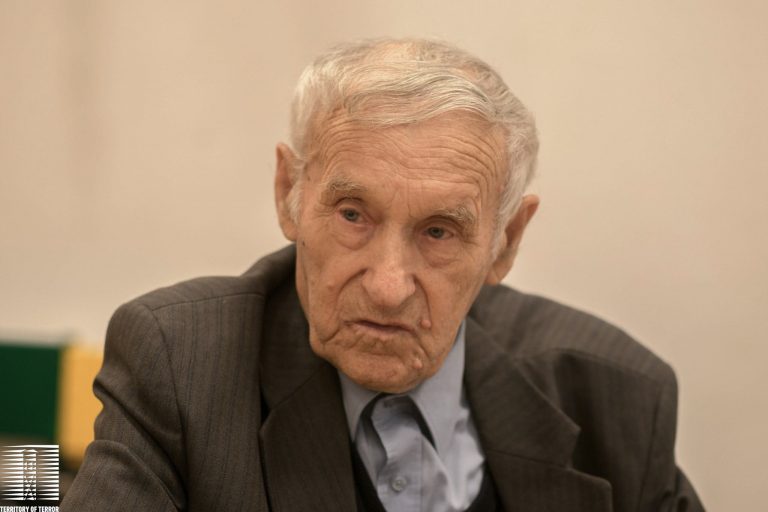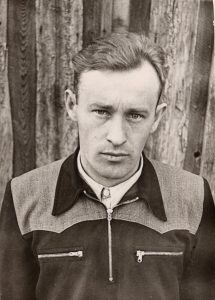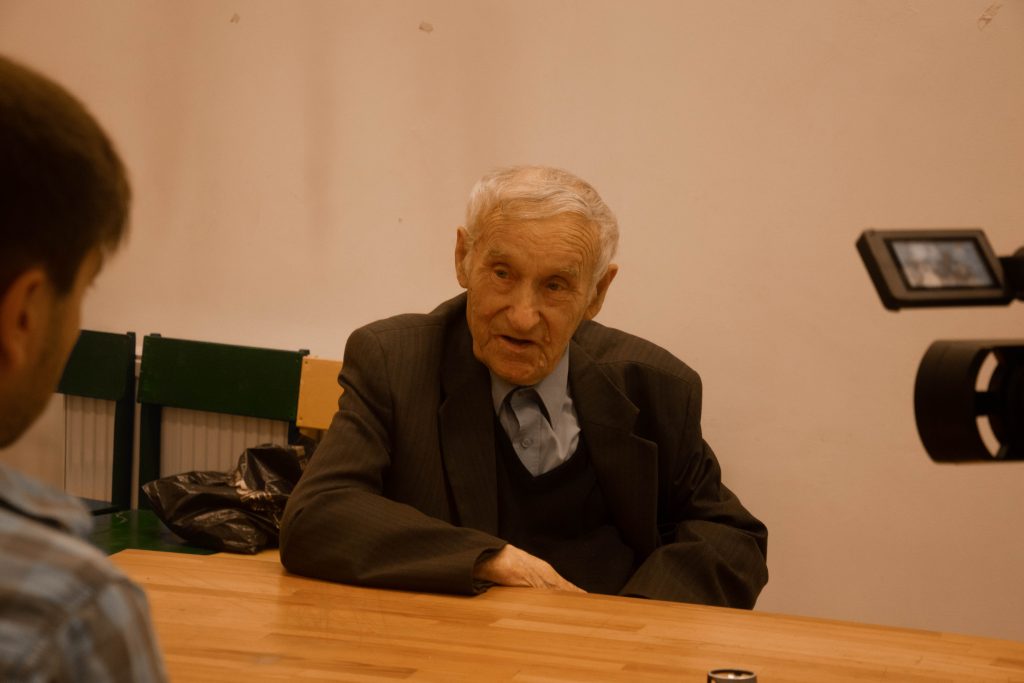Orest-Myroslav Savchuk
“We had wolf tickets*” *(passport issued to politically unreliable persons)
He was born on October 14, 1933, in Zolochiv, Lviv region.
He was born into a railway worker family. His mother was a housekeeper. As a child, Orest-Myroslav witnessed World War II: first, in September 1939 during the German-Soviet invasion of Poland, and later in June 1941 after the Wehrmacht’s invasion of the USSR. In particular, in the summer of 1941, as a result of the German bombing of Zolochiv city, his family was forced to hide in the basement. “The Germans bombed Zolochiv very terribly, they bombed it very badly. Many houses were on fire, falling apart in the center. And we hid in the cellar. We had a brick house – it was new, and all the neighbors came, because many houses in our neighborhood had thatched roofs, so people were hiding at our place… (…) Well, we were there, sitting in that cellar, bombs were falling around, we couldn’t light a candle. Children were crying, there were neighbors, there were many of us.”

So, as a result of intense hostilities, the Savchuk family left their homes and wandered around the surrounding villages for some time, until they found refuge in the Univ Monastery of the UGCC.
Pictures of a terrible war are engraved in the memory of a seven-year-old boy for life: “We went on to Zolochiv to get home. And there is a field, about one and a half to two kilometers in size, between Bonyshyn and Zolochiv. And the whole field is covered with corpses. There were dead soldiers – two, three, four, in a pile, those were young guys. And the stench is terrible because it was a big heat. It was necessary to go around because the road and everything were blocked. And horses, and that’s it. We got home, came home – there were no windows, no doors, the windows were broken. There was nothing – everything that was at home, everything disappeared. Doors were found in the trenches somewhere in the neighbors’ garden, and they began to collect wood and fix windows. And there was not much food.”
With the transition of the front to the east, the violence did not stop, but only gained momentum. In particular, the Nazis almost shot his father, they thought he was a Jew. “My father had a rather dark skin complexion, dark, he, apparently, had Tatars roots probably, I don’t know. And it was the war, the frontline was not far, and he didn’t shave, he had a beard. And the Germans saw him: “oh, he is a Jew, a Jew.” And they stopped, one of them took Dad to the wall and he was going to shoot. But a man came across a neighbor who knew German. And he explained to them: “He’s Ukrainian.” Well, and they let him go.”

As a child, Orest-Myroslav himself witnessed the Holocaust in Zolochiv, where the Germans created a ghetto in 1942-1943 and where they shot more than 5,000 Jews. “Well, the Germans built a ghetto, and many Jews were placed there in the ghetto… It is said that many were shot. There was a Jewish cemetery. They brought corpses to the cemetery, there were tombstones like that, then they took the tombstones somewhere, they places them on the roads or took them somewhere in Germany, I don’t know, those were marble tombstones… And they buried corpses there, the Jews themselves dug a pit, well, they immediately shot them there (…) And also, they searched the houses to see if the Jews were hiding anywhere. We lived, we had neighbors there, very good neighbors, there was a woman with a child, with a daughter, they were very good people, my mother was very good friends with them, everything was good. But the Germans took them away – probably shot them.”
The return of Soviet power and the end of the war did not bring the expected peace to the people of Western Ukraine, where the fierce struggle between the communist regime and the Ukrainian nationalist underground continued for ten years after the war. In October 1949, his father was arrested as a result of an MGB provocation. Later, a sister was put in jail, she was tortured during the investigation in the prison on Lontskoho Street. And on January 11, 1950, Soviet soldiers came to deport the whole family. Prior to the eviction, the mother and children were held for four months at the Zamarstynivska Prison in Lviv, where they were joined by their father and sister. Soviet investigators did not find enough evidence of guilt on them. Orest-Myroslav mentioned the conditions of detention at that transfer point: “The cell was packed, I know, it was around maybe 30 square meters. And there were 18 of us. Everyone slept on the floor. Of course, there was no bed, and no mattresses, people used everything they could. We were held until April 1. And on April 1, we were loaded into echelons and taken to the Primorsky Krai near Vladivostok.”
The journey to the Far East in a cattle car carrying 50 people lasted a whole month. “They made a hole and a kind of wooden handrail, and it was a toilet. 50 people, imagine. For a month. However, we were taken to the Russian sauna in Novosibirsk and Khabarovsk. Well, security was everywhere, each car was taken there separately, guards with machine guns and so on, that’s all, with dogs. So we went to the sauna to bathe and then – back to the car, and then the next car went to the sauna, and so on”. Speaking about children who were transported under these conditions, Orest-Myroslav recalls that minors after arriving at the final station “they could not walk on their feet.”

Upon arrival, the family first lived in a special settlement in the Ivanovka village, and then in the Solovyovsk village (Amur region of the RSFSR). His father worked as a blacksmith. Orest-Myroslav got a job as a car electrician. The decree of the Supreme Soviet of the USSR issued on May 19, 1958, released special settlers from Western Ukraine, but forbade them to return to their native places. Despite this, the Savchuk family came to Western Ukraine, but the local authorities did not allow them to settle in Zolochiv. So they moved to Mykolayiv, Lviv region, where Orest-Myroslav entered the College of Radio Electronics. Only in 1964, did the Soviet authorities rehabilitate the family and return the property.
“The sister (lived) in Mykolayiv, parents lived illegally in Zolochiv, they lived in some barns, there was no place to live. Because it was impossible to register, it was impossible to get a job anywhere. And then later, we got that house back, and then we… We didn’t have passports, we had “wolf tickets” – a booklet with two pages, of red color (surname, photo and that’s it). And you couldn’t get on the train, because they would arrest you on the train, they would consider you as a fugitive and then give you several more years in prison. So you couldn’t run away or something. Because everyone on the trains checked passports. That’s how the system worked.”
